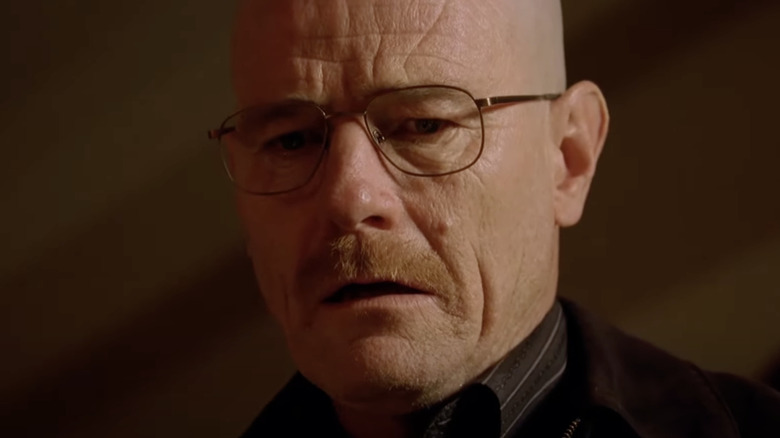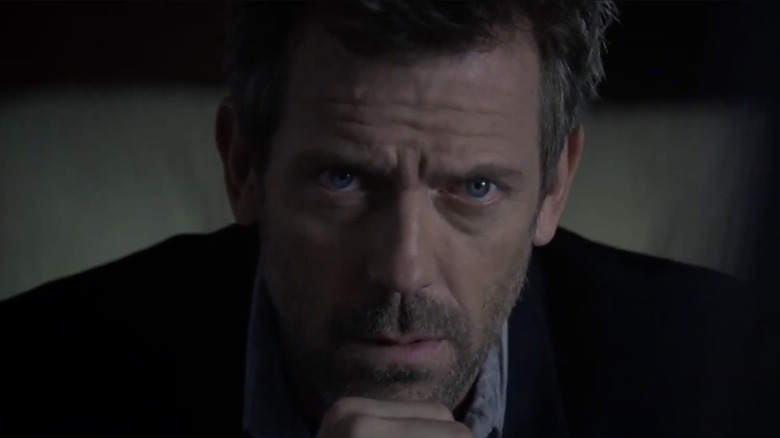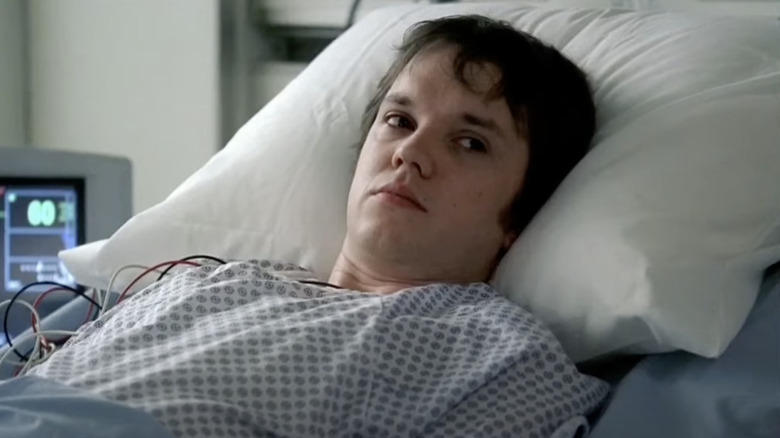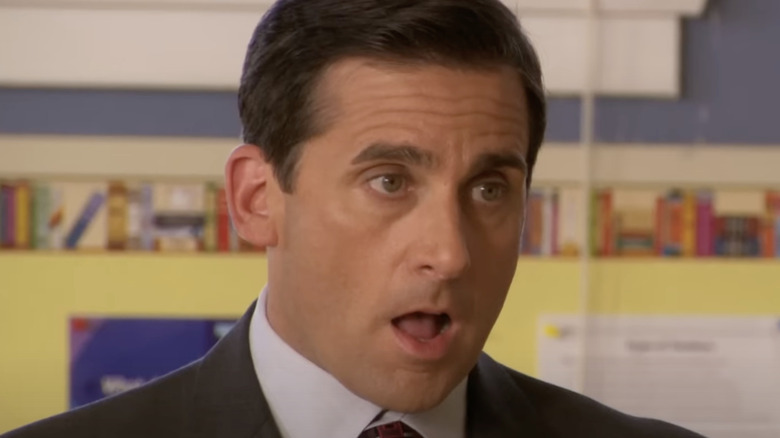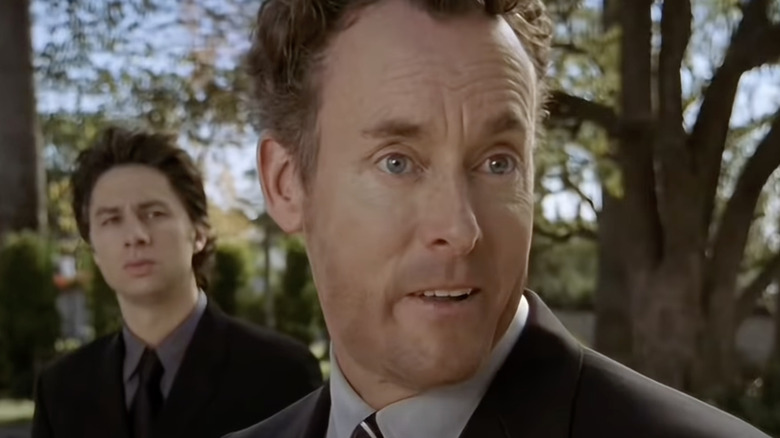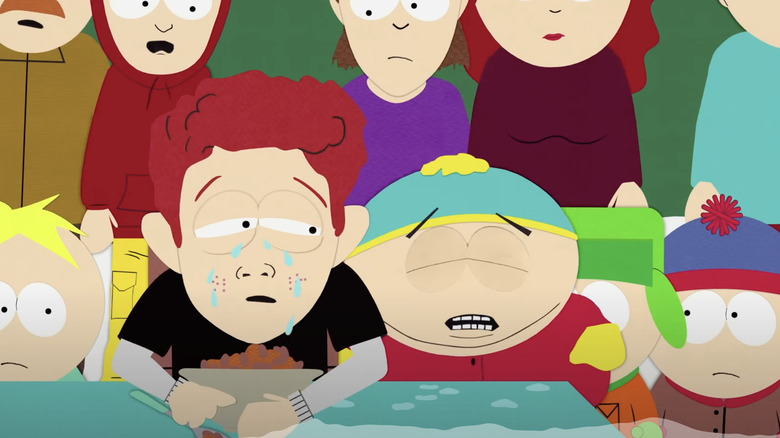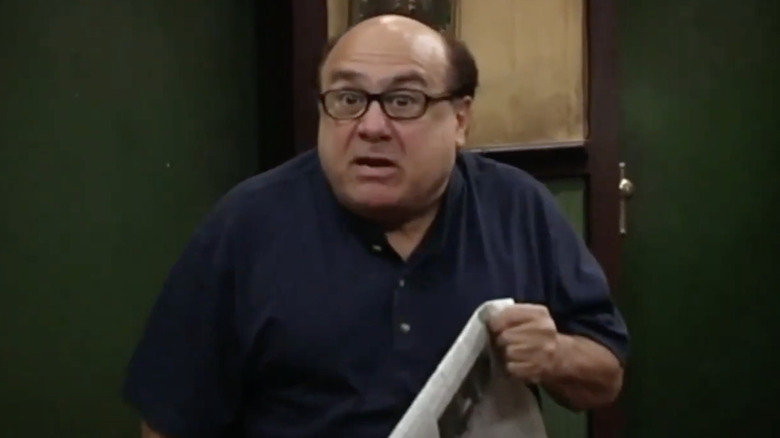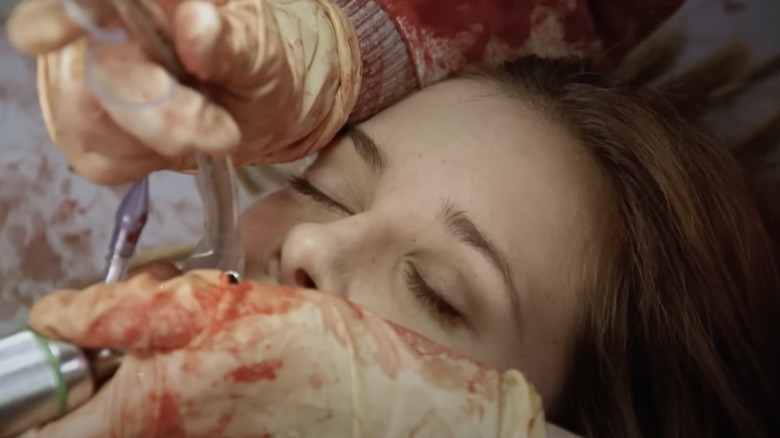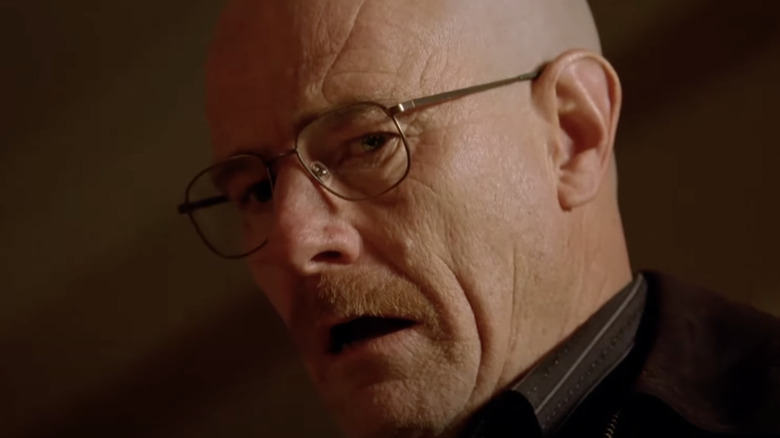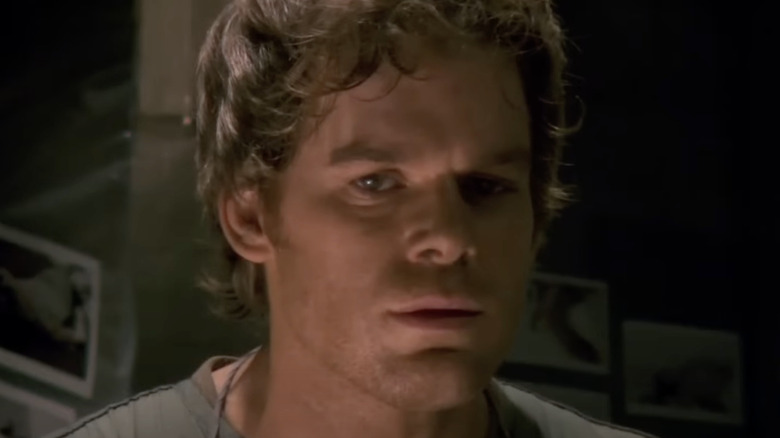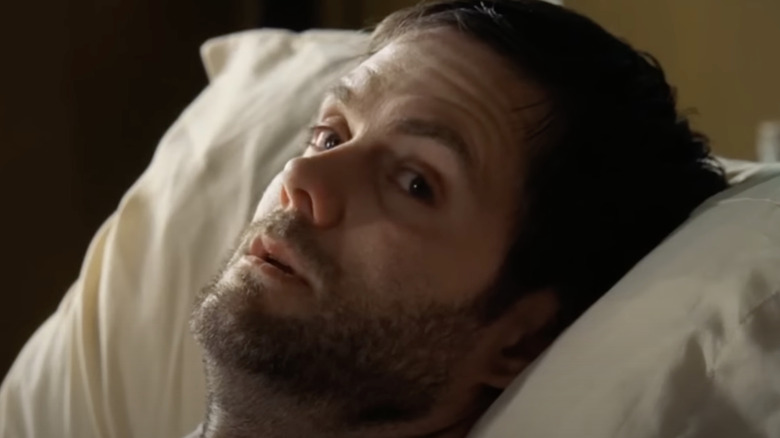The Darkest Episodes From 2000s Shows
For decades, it was relatively rare for TV shows to explore dark, twisted, and uncomfortable themes and subjects. Television was supposed to be light entertainment, and characters were supposed to have low-stakes, self-contained adventures for the most part, even on so-called dramas. The small screen has gotten a lot more serious in recent years, and while the darkest episodes from '90s TV shows may have made viewers from that time gasp and cry, it doesn't compare to what started happening in the 2000s. With the arrival of the new millennium came the era of "Peak TV" — the influence of restriction-free cable television and the edgy independent film movement took episodic television to new heights in storytelling and new lows in the volume of happy endings for fictional characters.
Medical dramas, crime shows, period pieces, and even sitcoms all started to push out from their comfortable confines of yore and got a little twisted, putting their characters and loyal viewers through some unforgettable and highly controversial TV moments. Here are the most scandalous, unsettling, and just plain darkest episodes of TV from the 2000s.
House - Simple Explanation
By the end of Season 5, "House" had settled into a formula that made it a compelling, heavily watched medical procedural drama. Each episode, a couple of patients would check into Princeton-Plainsboro Teaching Hospital with a mystery ailment, and Dr. House would crudely and cruelly insult his assistant diagnosticians until they all identified and treated the disease.
That all still happens on the 2009 episode "Simple Explanation." As the medical team copes with a patient who recovers from a terminal illness just as his wife and caretaker seems to be at death's door, a member of the staff unexpectedly dies. Dr. Lawrence Kutner, usually a cheery, optimistic, and kind individual, is discovered to have died by suicide. The other doctors deal with the loss and grieve him (particularly in a deeply sad funeral sequence) while also being totally unable to cope with the suicide because it just doesn't make sense to them. House, deep in denial, thinks Dr. Kutner must have been murdered. But alas, there is no "simple explanation" for suicide, or sometimes there is, but it's too tough for survivors to bear. This episode is partly so dark because it unexpectedly delves into the personal lives of one of its supporting characters — and doesn't offer up any easy answers in its sad and haunting depiction of suicide.
Bones - The Pain in the Heart
The main arc of Season 3 of the scientific police procedural "Bones" was the tracking and capture of a charismatic, persuasive, and brutal repeat murderer initially known only as Gormogon. Over time, the team of brilliant forensic anthropologists from the Jeffersonian, led by Dr. Temperance Brennan, along with its FBI liaison, Agent Seeley Booth, realize that Gormogon has an apprentice responsible for some of his most horrific acts. Much of the running time of the 2008 episode "The Pain in the Heart" is devoted to setting up nerdy and unlikely Dr. Hodgins as this apprentice. But then the team discovers that the inside operative is the even more unlikely intern, Zack Addy, a sweet, sensitive genius who is exactly the kind of person Gormogon could manipulate.
It's a particularly dark and sad episode of "Bones" — a show that often graphically depicts rotting human remains — that breaks the procedural format while also writing actor Eric Millegan off of the show, after Zack is convicted of murder and sentenced to live out his days in a mental health facility.
The Office - Scott's Tots
NBC's Americanized version of the hit British sitcom "The Office" helped popularize cringe comedy — viewers laughed uncomfortably while they mentally cowered at the embarrassing, audacious, and cruel antics of bumbling paper company branch office manager Michael Scott. Seemingly unaware of the damage and chaos he leaves in his wake, Michael has nothing to offer but is so desperate to be liked that he routinely makes promises that he can't possibly meet. In one of the most messed up things that happened on "The Office," the 2009 episode "Scott's Tots" finds Michael's pathological neediness basically ruining the near future for a whole classroom of innocent children.
About a decade earlier, Michael created the "Scott's Tots" program during a visit to a local elementary school. Wanting to impress some third-graders, Michael hastily promised to pay for all of their college tuition upon their eventual graduation from high school. He didn't have the money to pay for that then, but was self-deluded into thinking his paper company salary would grow so aggressively that he would with time. In the "Scott's Tots" episode, Michael must then address his charges to their faces after sitting through an extremely awkward appreciation assembly held in his honor. It's excruciatingly uncomfortable when Michael admits he's left all those kids in the lurch. His arbitrary, hapless graduation gift somehow makes it even worse: a round of PC laptop computer batteries.
Scrubs - My Screwup
Patients died all the time on the medical dramedy "Scrubs" — that's just part of life for hospital doctors. The show deftly weaved tragedy with comedy, particularly via fantasy sequences from the mind of young resident Dr. John Dorian. The 2004 episode "My Screwup" used that entrenched device of reality departure to tell a devastating story of grief and to give viewers a shocking twist ending.
The usually unflappable physician in charge, Dr. Perry Cox, is too busy planning his son's first birthday party and celebrating his beloved brother-in-law Ben's newly cancer-free status. He allows Dr. Dorian to care for one of his patients, Mr. Taylor, who apparently dies while Dr. Cox is out of the hospital. This sends him into a rage, and he takes control over the hospital and works for many days straight. The episode ends with Dr. Cox and Ben having an outdoor conversation about the power of forgiveness. Dr. Cox admits he doesn't want to go to the party, because it isn't a party at all — it's Ben's funeral. Mr. Taylor hadn't been the one who died — the suddenly disappeared Ben did. The persistently tough and unemotional Dr. Cox crumbles, physically and emotionally.
South Park - Scott Tenorman Must Die
Trey Parker and Matt Stone became two of the richest comedians in the world because of "South Park," and many of the show's funniest and most memorable moments come from the monstrous behavior of third-grader Eric Cartman. An evil, greedy narcissist, Cartman will do anything or hurt anyone to serve his own needs, and in the 2001 episode "Scott Tenorman Must Die," Cartman exacts revenge with a scheme for punishment that far exceeds the nature of the original slight.
High school kid Scott Tenorman cons Cartman into buying a bag of pubic hair for $10, so Cartman asks Scott's favorite band, Radiohead, to come to town and visit their biggest fan, lying that he's dying of anal cancer. Cartman tells Stan and Kyle his "real" gambit — he's going to train a starving pony to bite off Scott's genitals, and he'll embarrass himself by crying in front of Radiohead. The kids warn Scott, who dispatches his parents to deal with the pony.
Cartman reveals all at the South Park Chili Con Carnival: He knew his friends would tell Scott, and that Scott would send his parents to the pony farm, where he knew Farmer Denkins would shoot and kill trespassers. And so that chili Scott's chowing down on? It's made out of his own parents, whose bodies Cartman mutilated. Scott vomits and cries, right when Radiohead shows up. They tease him, and a victorious Cartman licks away Scott's "tears of unfathomable sadness."
It's Always Sunny in Philadelphia - Mac Is a Serial Killer
One of the best shows to binge watch after a night out, "It's Always Sunny in Philadelphia" has all the bones of a traditional sitcom. True, it's about a small group of friends who often get themselves into bad situations after a series of misunderstandings, but everything is darker and everyone is mean. The 2007 episode "Mac Is a Serial Killer" feels like a classic light-hearted sitcom episode, what with the withheld information and wacky coincidences, except it's about serial killers.
When Mac shows up in the same clothes he wore the previous day and is cagey about his whereabouts, the gang thinks he might be a local serial killer on the loose. He's not, but he does have a secret — he's dating a trans woman, and he doesn't want to tell his friends yet. Meanwhile, Dennis and Dee set out to trap the real killer; to get into the proper mindset, they stalk their acquaintance the Waitress with sharp tools stolen from a hardware store manned by Dee's neighbor, Gary.
The two contingents merge and call Mac, with Dee pretending to be a single woman named Sandy to lure Mac to Gary's apartment. Frank tries to kill Mac with a chainsaw, and Mac finally discloses his new relationship. Charlie looks for a beer in Gary's fridge and finds a whole bunch of decapitated heads. Gary comes home, and Frank turns on the chainsaw as the episode concludes, implying the gang murders the murderer.
ER - Be Still My Heart and All in the Family
Patients experiencing medical trauma frequently and heartbreakingly died on "ER," and the series showed the profound impact of the work on the doctors who tried their hardest to save lives everyday. The two-part saga from 2000, "Be Still My Heart" and "All in the Family," are the best "ER" episodes ever, according to IMDb users, and they offer some of the series' most harrowing medical drama while also making it personal for the doctors, overwhelmingly and tragically so.
It's not a lovely Valentine's Day in the ER, as multiple doctors try and fail to save the lives of a couple involved in a car accident while the victims' young kids look on, another team treats a sick dog, and the sometimes romantically entangled physicians Carter and Knight both see Paul, a man with symptoms of serious mental health issues. Carter neglects to treat Paul and storms off. Paul then suffers an episode, finds a cake knife, and uses it to viciously stab Dr. Knight. Carter discovers his dying colleague on the floor of the exam room after Paul stabs him too, and the pair stare at each other as they drift into unconsciousness in pools of their own blood. Dr. Weaver finds them some time later, and despite the best efforts of the trauma response team, Dr. Knight dies from internal injuries suffered in the stabbing. Carter survives, a broken man after the death of his colleague and potential love.
Breaking Bad - Phoenix
From the outset, it was clear that "Breaking Bad" was going to be a gloomy affair. The series tracked the descent of Walter White, a failed genius scientist who becomes a cutthroat New Mexico methamphetamine cooker and kingpin to fund his cancer treatments and provide for his family after his imminent death. Season 2's penultimate episode, "Phoenix," represents a particularly bleak turning point in Walt's moral downfall.
Walt, resentful over missing his baby's birth because he had to handle a major meth sale when his partner, Jesse, was too high on heroin to do it, refuses to hand over his accomplice's cut of the profits. Jesse's new girlfriend and fellow drug abuser, Jane, concocts a blackmail scheme to get the money. Walt decides to hand over the cash, but only to Jesse. Upon arriving at Jesse's apartment, Walt finds him and Jane passed out from the effects of heroin. Upset that Jesse is using such serious and dangerous drugs, Walt tries to rouse his partner, which accidentally makes Jane shift onto her back. Momentarily, she vomits and then begins to choke. Walt shows the kind of person he's become — he chooses to watch Jane die, rather than easily move her onto her side so that she doesn't asphyxiate. He sobs quietly, knowing that the blackmail scheme is off and also that the individual responsible for pulling Jesse into a world of addiction is no longer a problem.
Dexter - The Getaway
"Dexter" presented an audacious, gruesome, and psychologically taxing spin on the familiar TV genre of cop-versus-murderer. Dexter Morgan, a blood spatter analyst for the Miami Police Department, harbors an insatiable urge to kill — and he rationalizes his serial murdering by only killing really bad people, primarily other serial killers. "Dexter" became a TV show that seriously crossed the line with its Season 4 finale, 2009's "The Getaway."
Dexter spent most of the season getting close to Arthur Mitchell, a church-going family man who's actually a self-loathing and abusive husband and father as well as the Trinity Killer, so nicknamed because he murders in threes. Arthur figures out Dexter is also a murderer, but Dexter manages to make his move and kill (with a hammer) this man who's more monstrous than he is, he hopes. Dexter thinks his blood lust is permanently satiated, as he looks forward to a quiet, murder-free life with his family. He returns home and finds his wife, Rita, dead for hours by Arthur's hand, in a bathtub full of her own blood. His young son Harrison sits traumatized on the bathroom floor covered in his mother's blood, mirroring Dexter's earliest memory, of his mother's murder.
Criminal Minds - To Hell and Back
CBS enjoyed 15 years of high ratings for "Criminal Minds"; millions found it satisfying to watch extremely smart detectives and profilers stop the most despicable and frightening murderers and kidnappers. The good guys usually won on "Criminal Minds," but the happy ending of catching serial-murdering villains couldn't overcome the horrific imagery and story conjured by the two-part Season 4 ender in 2009: "To Hell..." followed by "...and Back."
When numerous people living on the edge of society in Detroit — sex workers and unhoused drug users — begin to disappear, the Behavioral Analysis Unit takes the case, suspects a serial killer, and believes it's a man working out of nearby Canada. The BAU finds their culprit, and it's a sadder, more complex, and far more gruesome situation than the team could've imagined — or network TV viewers would expect. Developmentally disabled adult Lucas Turner had paralyzed his brother, Mason, when he wanted to sell their family pig farm. Lucas wound up caring for his brother while also venturing out to steal medical supplies and kidnap people — whom he used to perform deadly rudimentary stem cell removal procedures to save his brother, all under Mason's orders. As for the spent bodies of the disappeared, Lucas fed those to the pigs.
King of the Hill - Pigmalion
Across its 14-season run, "King of the Hill" consistently told low-key, mildly amusing, realistic stories about proudly Texan propane salesman Hank Hill trying to relate to his goofy son or make sense of a rapidly changing world. Writers deviated from the form very occasionally, never more dramatically than with the surreal and macabre 2003 episode "Pigmalion," the only "King of the Hill" episode about emotional abuse and manslaughter.
Luanne attends a class at the learning annex and meets Trip Larsen, a pork processing tycoon. He offers Luanne a job and instantly develops an unhealthy fixation. He dictates how Luanne dresses and wears her hair, and moves her into his home without her foreknowledge. (Peggy vocally opposes the relationship — and she receives a severed pig's head as a warning.) Following a middle-of-the-night pig attack, Trip serves Luanne drugged warm milk, and while she's out, dyes her hair red. He gives away the game: Trip is transforming Luanne into a woman from an old Larsen Pork Products poster that he idealized since childhood. Rejecting a marriage proposal from Trip while he's dressed in a pig costume at a Halloween party, Luanne flees into a slaughterhouse and gets caught on a conveyor belt. As she's about to be turned into sausage, Trip joins her and welcomes death, only for Peggy to find them at the last minute — she saves Luanne, while Trip gets impaled on a spike. The two women walk away from the violent death they just witnessed.
If you or anyone you know is struggling or in crisis or needs help with addiction issues, contact the relevant resources below:
- If you or someone you know i, help is available. Call or text 988 or chat 988lifeline.org.
- Visit the Substance Abuse and Mental Health Services Administration website or contact SAMHSA's National Helpline at 1-800-662-HELP (4357).
